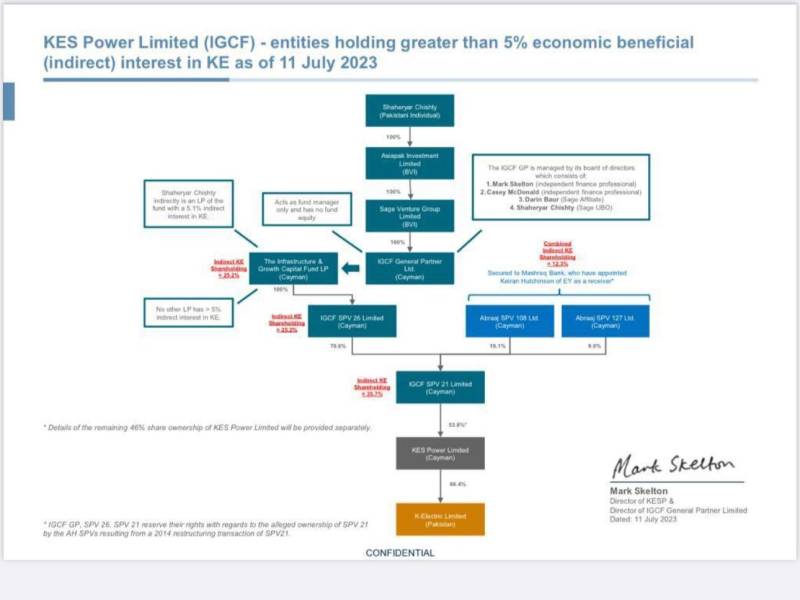A leaked document carrying the signature of Mark Skelton, the chairman of Karachi Electric (KE), has raised questions on the size of shares that Shehryar Chishti claims to own in the power utility through the Infrastructure and Growth Capital Fund (IGCF Fund).
The documents from Alvarez and Marsal, a renowned international consulting firm, show that Shehryar Chishti is indirectly an LP (Limited Partner) of IGCF Fund "with a 5.1 % indirect interest in KE".
This is a startling turn of events that contradicts previous portrayals by Shehryar Chishti, who claimed to have a majority shareholding in KE.
The document was signed by Mark Skelton, the incumbent chairman of KE and chairman of the Cayman Island-registered firm KES Power Limited (KESP), the parent entity of KE. Skelton is also a director on the board of IGCF General Partner Limited -- which manages the IGCF Fund. Skelton is also the Managing Director of Alvarez and Marsal Europe LLP.
Skelton had signed the document on July 11, 2023, for a legal filing. The verified document is titled "KES Power Limited (IGCF) – entities holding greater than 5% economic beneficial (indirect) interest in KE as of July 11, 2023."
A debate has raged in the Pakistani media in recent months where Shehryar Chishti claimed to have become the "majority" owner of K Electric Limited, with numerous reports suggesting that he holds a substantial ownership stake in the company.
The original Saudi and Kuwaiti investors, Al-Jomaih and NIG, have throughout rejected the claim saying they hold over 30.7% indirect shares in KE and that the majority ownership claim by Shehryar Chishti is misleading. This notion has now been reinforced after the emergence of the document carrying the signatures of the KE and KESP chairman.
The document, leaked by anonymous sources, contains detailed ownership information and structure details that expose the true extent of IGCF Fund's involvement in K-Electric.
The document reveals that approximately 30% of IGCF SPV 21, the third shareholder in KESP (apart from the Saudi and Kuwait groups), is held by Mashreq Bank. This effectively translates into Mashreq Bank holding a 10.5% indirect stake in KE. Comparing this to the ownership stake of Chishti as a Limited Partner / Investor in the IGCF Fund, Chishti's see-through ownership turns out to be only 5.1%, i.e., less than half of that of Mashreq Bank.

Chishti's economic stake in KE comes about from purchasing Limited Partners interests from various investors in the IGCF Fund.
Originally, there were over 80 investors in the IGCF Fund when it was established in 2008. With an investment horizon spanning over 15 years, much beyond the originally envisaged life of the fund, investor fatigue set in, and many investors in the IGCF Fund simply wanted to cash out.
Hence, the pecking order of indirect ownership in KE would start at the top, with the largest chunk held by the original investors in KE since its privatisation back in 2005, being the Saudi and Kuwait conglomerates (30.7%). Next in line would be Mashreq Bank (10.5%), which sort of inherited the stake due to the misfortunes of the Abraaj group -- now in liquidation. The smallest portion amongst these four groups belongs to Chishti (5.1%) through his offshore entity in the British Virgin Islands (BVI).
The exposure of the real ownership structure of K Electric has led to significant consequences in various quarters. Investors and stakeholders, who relied on past media portrayals, are now grappling with a new reality.
Legal experts have also started scrutinising the implications of this revelation. Questions about the integrity of financial disclosures, corporate governance, and regulatory oversight are being raised. The sudden change in the perception of the company's ownership has opened the door for potential legal challenges and investigations.
Moreover, it raises the importance of accurate and transparent reporting in the corporate world.
Uncovering Shehryar Chishti's actual stake in KE serves as a cautionary tale about the power of misinformation and the need for accurate, verified information. The uncertainty arising from concealed and non-transparent transactions conducted by Sage, a BVI company owned by Chishti, is now being revealed to the public at large.
It also brings forth the supervisory role of regulatory authorities to inquire and investigate the reality behind concealed transactions in offshore jurisdictions, especially when such transactions concern assets of national security of Pakistan.



